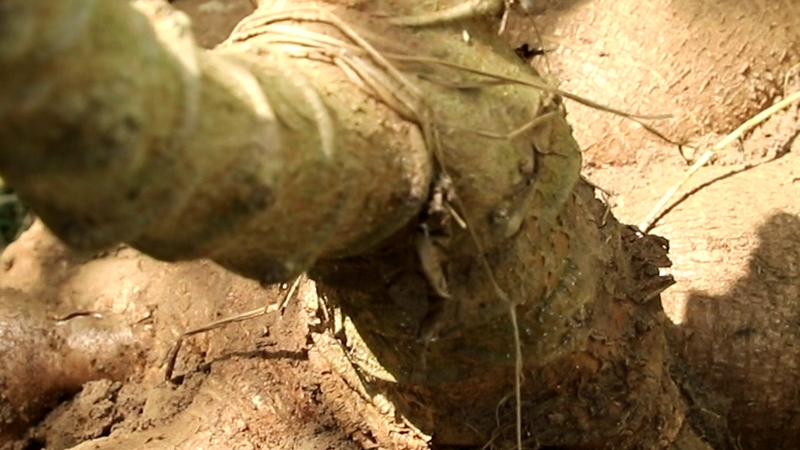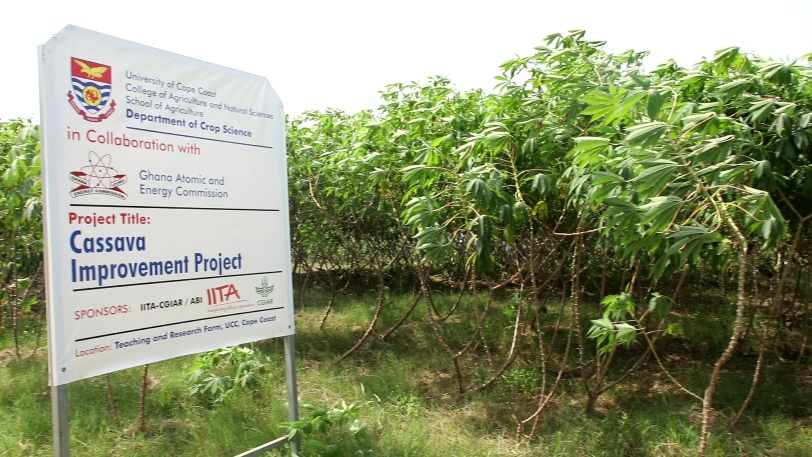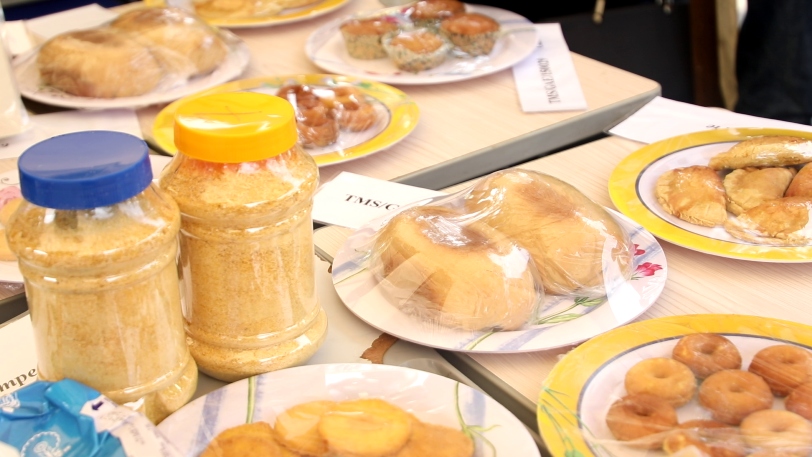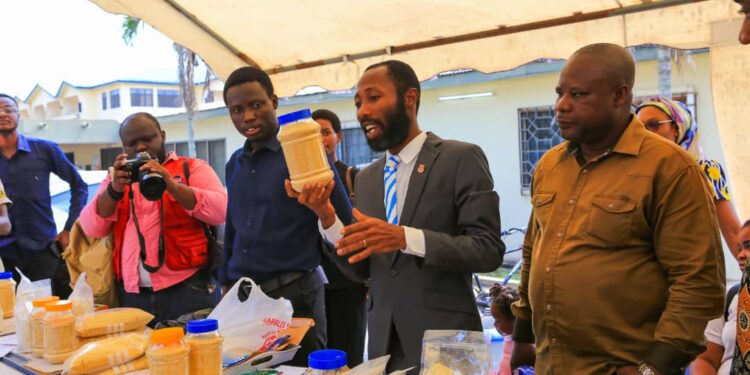The Department of Crop Science at the University of Cape Coast (UCC), in collaboration with the Ghana Atomic Energy Commission and International Institute of Tropical Agriculture (IITA), has unveiled four new yellow-fleshed cassava varieties.
These varieties are being proposed for approval and circulation across Ghana and West Africa to boost cassava production in the region.
The University of Cape Coast has long been a trailblazer in agricultural research through its Crop Science Department.
Over the past 15 years, the university has gained recognition for innovative initiatives, including the “Cape Vars Bankye,” a cassava variety developed at UCC.
This breakthrough solidified the university’s reputation for excellence in academia and practical agricultural solutions.

‘’Hewale duade” one of the new Yellow-fleshed Cassava varieties at the Teaching and Research Farm of the University of Cape Coast.
Read This Also: WASSCE Results to Be Released by December 29 – Education Minister
During a ceremony held on December 20, 2024, the four new yellow-fleshed cassava varieties produced by UCC were introduced by a team led by Dr. Emmanuel Ogyiri Adu, the Principal Investigator.
The event also featured Prof. Elvis Aasare Bediako, Vice-Chancellor of the University of Energy and Natural Resources, Dr. Godwin Amernope, a research scientist at BINARI-GAEC, Prof. Paul Agu Asare, alongside other researchers.
The varieties were presented to the National Varietal Release and Registration Committee (NVRRC) for consideration and approval.
Speaking on the sidelines of the event, Dr. Solomon Gyan Ansah, Director for the Crop Services and Chairman for NVRRC, commended the collaboration between UCC, the BINARI-GAEC, and the Institute of Tropical Agriculture (IITA).

A shot of the University of Cape Coast Teaching and Research Farms where the project was piloted.
He emphasized, “And of course, I must commend Department of Crop Science – UCC as well as BINARI-GAEC and as well as IITA. And this particular one, you see, we are looking at yellow flesh cassava. And when we talk of yellow flesh cassava, we have some of them that have been released, but they are not poundable. And apart from that too, we have some specific traits that we are looking for.”
Dr. Gyan Ansah highlighted the attributes that would make the varieties acceptable, including high yield and elevated carotenoid content.
“The dry matter content, we really want it to be very high. And we are looking at the carotenoid content, which that one too, we want it to be very high. And then, and of course, when we talk about the carotenoid content, that is why it is related to the vitamin A. We really want, especially the young ones that are coming, to have very good eyesight, very, very, very key. So when they eat this cassava, I tell you, when they eat it and eat it very well and combine it with, should I say, to make sure that they eat balanced diets. They are going to get very good eyesight and they need energy to really learn,” he explained.
After inspecting the crops on the field and assessing the presentations on each of the proposed variety, the chairman of NVRRC, Dr. Gyan Ansah, said the four yellow fleshed cassava have been recommended for release considering their substantial benefit to the nation and the agriculture sector.

Some processed foods made from the Yellow- fleshed cassava being proposed for Release
In an exclusive interview with CBS, Dr. Emmanuel Ogyiri Adu expressed his excitement over the acceptance of the new varieties for further development. These varieties are designed to be high-yielding, rich in beta-carotene, and above all possessing farmer preferred traits such as high dry matter content and mealiness.
By introducing these nutrient-dense varieties, it seeks to improve food security, enhance nutrition, reduce malnutrition in children and above all contribute to Ghana’s agricultural resilience. He urged stakeholders to adopt these new varieties rich in vitamin A for gari production, particularly for Senior High Schools, where gari is widely consumed.
Dr. Ogyiri Adu also emphasized the resistance of the new varieties to Cassava Mosaic Disease (CMD), a major threat to cassava yields.
“For you to be able to develop cassava varieties that are resistant to the CMD, then it means it’s a bigger feat to the crop science department and the university as a whole,” he stated.

A cross section of the research team at the exhibition site
With the certification process underway, UCC is preparing to scale up production by cultivating over 20 acres of cassava at the University outstation at Twifo Wamaso. Dr. Ogyiri Adu noted that the next phase involves training farmers on cultivation techniques and providing cassava sticks for large-scale replication.
“The release of these varieties will tell the world that when we talk about the global impact of our research as a university, it’s not only about the book, but we have evidence. Our handiworks are showing the impact of the research on the economy, the impact of the research on the nation and the global as well,” he added.
The new yellow-fleshed cassava varieties are versatile, suitable for producing cassava flour, which can be used in various meals and pastries. The project received substantial support from the International Institute of Tropical Agriculture (IITA), with Dr. Elizabeth Parks of IITA-Zambia playing a pivotal role in securing funding. Other key contributors include Peter Ilelubey of IITA and Dr. Amenope, who initiated the collaboration with UCC.
The success of the project is attributed to the dedication of several individuals and institutions, including Prof. Michael Osei Adu, Head of the Crop Science Department; Prof. Henry De-graft Acquah, Dean of the School of Agriculture, Prof. Kingsley Taah, Former Head of Crop Science Department; James Nyarko Amoah, a Technologist and all farmers that were involved in the on-farm trials. Their collective efforts underscore UCC’s commitment to advancing agricultural research and innovation in Ghana and beyond.


























